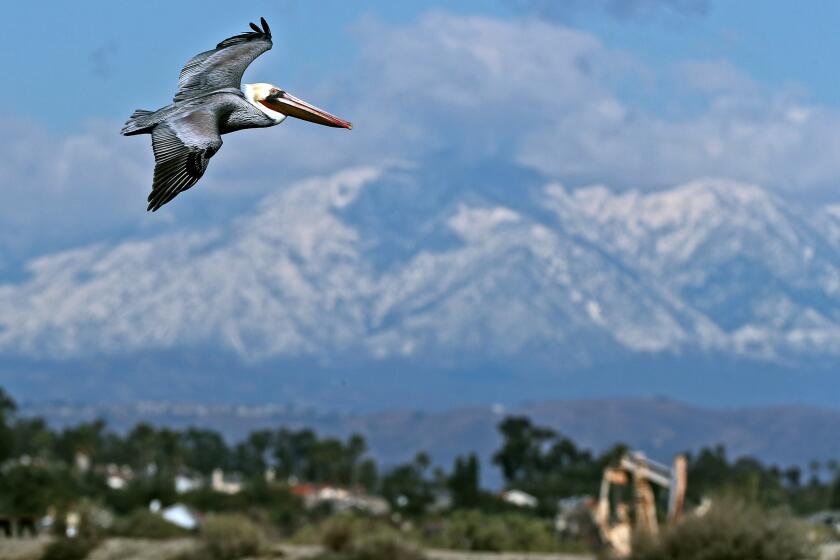Prison Cell Awaits Man, Regardless of Jury’s Verdict in 1980 Shooting
Even if the jurors decide that Dwayne McKinney was not present when Walter Bell was killed Dec. 11, 1980, at a Santa Ana Burger King restaurant, he will have to return to prison for the murder.
But the Orange County public defender’s office is determined to prove his innocence, anyway.
McKinney, of Ontario, was convicted 4 1/2 years ago of first-degree murder in the execution-style slaying of Bell, the manager of the restaurant. The jury found then that the killing was committed during a robbery, which resulted in a sentence of life in prison without parole. Without that finding, he would have received 25 years to life.
Two years ago, the 4th District Court of Appeal ruled that McKinney should be tried again because the judge had not instructed the jury that it had to decide whether he intended for his victim to die. The new trial, which got under way two weeks ago in the courtroom of Orange County Superior Court Judge David O. Carter, is for sentencing purposes only. McKinney’s conviction will stand regardless of what the new jury decides.
Nonetheless, Chief Deputy Public Defender Carl Holmes is trying to convince the jury that McKinney was nowhere near the scene of the murder. His argument is that McKinney couldn’t have intended to kill Bell because he wasn’t there.
Witnesses have testified that Bell was ordered by the robber to put his head down on a desk in a back office at the restaurant, while another employee was ordered to stay on the floor next to him. Bell did as instructed, but his head began twitching, apparently out of fear. According to the other employee in the room, the assailant told them not to move, “or you’ll get this.” The gun then fired, killing Bell, who was less than three feet away.
Justice Sheila P. Sonenshine wrote in the appellate opinion that there were two reasonable interpretations of what happened. One was that the manager moved and was deliberately killed. The other was that “McKinney either panicked or reacted in such a way that the gun fired, killing the manager.”
Deputy Dist. Atty. Jeoff Robinson, the prosecutor at the second McKinney trial, contends that there is a third interpretation.
“We think when McKinney said, ‘Don’t move or you’ll get this,’ he was talking to the fellow on the floor, and he killed the manager as a warning to the others not to try to follow him,” Robinson said.
Robinson said he believes that the current trial is especially important because, if the jury believes McKinney is innocent, it might become grounds for a new appeal for him that “could unravel the whole case.”
So far, the defense presented by Holmes has ignored Sonenshine’s suggestion that the killing might have been an accident. Instead, he has brought back many of the witnesses from the original trial who testified that McKinney was in Ontario at the time of the shooting.
Holmes also has tried to show that a gunshot wound McKinney suffered in his right leg the month before the killing made it impossible for him to leap over the counter at the restaurant, as witnesses say the killer did.
Orthopedist Lawrence Barnett has testified that it was “highly unlikely” that McKinney could have vaulted the counter with his leg injury.
That led to an unusual courtroom demonstration involving prosecutor Robinson.
Barnett had said it would have taken three months for McKinney to regain good use of his leg. Robinson asked how long the doctor thought it would take someone with an Achilles tendon injury to regain enough form to go jogging. Barnett said about six months.
Robinson, somewhat to the jurors’ astonishment, rolled up his right trouser leg, took off his sock and got the doctor to look at his own Achilles tendon injury.
Robinson then said he was out jogging at a regular pace less than three months after his injury.
“Could it be, doctor, that if someone really wanted to run badly enough, they could do it in a shorter period of time than you would normally predict?” Robinson asked.
“It’s possible,” Barnett answered.
“And doctor, if someone really wanted money badly enough, could he have vaulted that counter with an injury like Mr. McKinney’s?” Robinson continued.
“It’s possible, but it’s not probable,” Barnett said.
Robinson countered Barnett’s testimony Friday with the doctor who treated McKinney at the hospital for his gunshot wound. Dr. Carmen Diorio said that McKinney’s leg should have improved considerably by the time of the Burger King shooting.
Closing arguments in the case are expected Monday.
More to Read
Start your day right
Sign up for Essential California for news, features and recommendations from the L.A. Times and beyond in your inbox six days a week.
You may occasionally receive promotional content from the Los Angeles Times.






